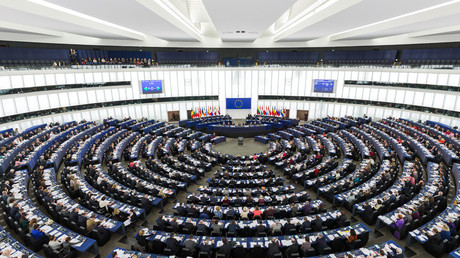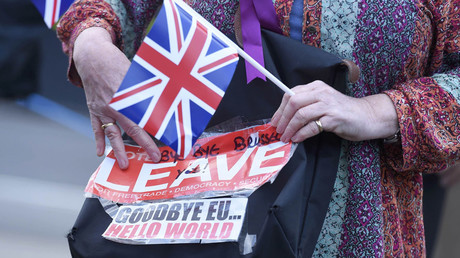France & Germany plan to lead post-Brexit EU reform – leaked memo
Paris and Berlin want to reinforce integration within the EU after the British referendum, bolstering common defense, migration and fiscal ties among the members, media revealed citing a French-German memorandum.
A common French-German memorandum entitled ‘A strong Europe in the world of uncertainties’ was released by Poland’sTVN broadcaster on Monday. The document is said to be authored by French Foreign Minister Jean-Marc Ayrault and his German counterpart Frank-Walter Steinmeier.
The nine-page memo comes after the British voted in a referendum to leave the EU, a decision which the document describes as a loss of “not only a member state, but a host of history, tradition and experience” that the UK has shared with Europe throughout the last decades.
In the joint paper, Ayrault and Steinmeier allegedly wrote that both “Germany and France have a responsibility to strengthen solidarity and cohesion within the European Union” despite “different degrees of ambition towards further integration among the member states.”
The document, which the Polish broadcaster claimed was a bombshell plan to create a “super-state” led by a Paris-Berlin alliance, proposed closer cooperation on internal and external security, the migrant crisis, as well as a change in the EU’s fiscal and economic policy.
"The EU will in future be more active in crisis management,” the memo reportedly said, proposing to introduce the “European Security Compact” – a number of military means able to deal with emerging crises, including a deployable high-readiness forces, developing common military spending plans as well as investing in conflict prevention.
The “European Security Compact” places special emphasis on internal security, mentioning the creation of a “European platform for intelligence cooperation,” improvements of data exchange and the establishment of an EU civil protection corps.
According to the leak, the foreign ministers also called migrant and refugee influx to Europe "the central challenge for the future of our continent," saying the bloc must be able to secure its external borders while remaining committed to its humanitarian values. “Europe should stay open to what migration and mobility can contribute to our society,” they went on.
However, when it comes to taking in refugees, the top diplomats allegedly wrote that “a situation in which the burden of immigration is unevenly shouldered by a few member states is unsustainable.”
On financial policy, the paper proposed a future joint budget to "promote the convergence of our economies, achieve sustainable growth that creates jobs, and make progress towards the completion of the European monetary union.” This part of the document also added that “France and Germany have a shared responsibility to build a robust monetary union that is globally competitive.”
The French Foreign Ministry later denounced the reports of planning to create a “super-state instead of the EU.” Romain Nadal, spokesman for the ministry, told RIA Novosti “the [report] has been unfounded” and that the ministers “discussed consequences of the British referendum.”
However, earlier on Monday, President Francois Hollande did say that France and Germany should take the initiative in the EU now as the UK decided to leave.
“It is now the responsibility of France and Germany to take the initiative, because we have shown that from unhappiness, horror and war, we [two] were able to forge a strong friendship,” Hollande said, referring to the countries behind the EU’s founding 1957 Treaty of Rome.
In the meantime, Brexit has already caused both a financial downturn and political turmoil. European stocks and the euro plunged on Friday after Britain voted to leave the EU. The common currency suffered its biggest fall since its introduction in 1999. At the same time, the British pound hit a new 31-year low with shares of many British companies sustaining heavy losses.
As the UK is apparently struggling to digest the EU referendum result and not to fall apart, some political forces in Europe are ready to follow its lead and urge their countries to conduct similar referendums.
Norbert Hofer, an Austrian politician who narrowly failed to become the EU’s first far-right head of state in last month’s presidential run-off in Austria, recently said that his country could also hold a referendum on EU membership within a year in case of further political “centralization” in the EU.
The Netherlands should hold its own referendum on whether to leave the EU as soon as possible, the leader of the Dutch anti-immigrant PVV party, Geert Wilders, said on June 24. Denmark's populist anti-immigration Danish People's Party (DF) also declared the need for a “stay-or-leave” referendum.
France's right-wing National Front party joined in the calls for a referendum on EU membership. The party leader, Marine Le Pen, even made such proposal at the meeting with the President Hollande, but he firmly rejected that idea, provoking a wave of criticism from the right-wing politician.
Matteo Salvini, leader of Italy’s right-wing Northern League party, praised the “courage of free citizens” of the UK following the British referendum result, while Italian opposition 5-Star Movement, the country’s second most popular political party, vowed to push for its own proposal for a referendum on whether to stay in the EU.
https://www.rt.com/news/348615-france-germany-eu-reform/



0 Comments:
Post a Comment
Subscribe to Post Comments [Atom]
<< Home